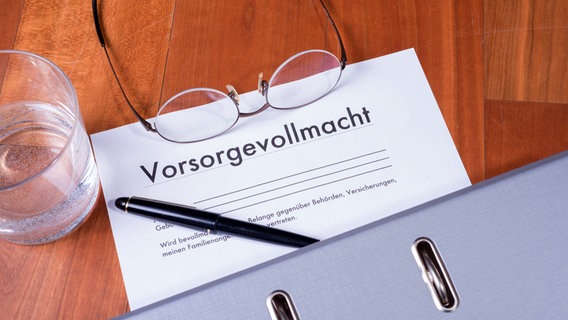Status: 03/13/2023 2:42 p.m
If you don’t leave a will, you risk quarreling in the family. That’s why you should put your last will in writing. Consumers should take this into account when writing and know about inheritance law.
If there is no will, the assets are distributed according to the statutory succession. This is often not in the interest of the bequeathed (in legal German: “ertater”). Anyone who writes a will can distribute their assets differently than the law regulates. A will is particularly important if a non-marital partner or a person who is not related by blood is to inherit.
How is the legal succession regulated?
The assets only go to heirs who belong to the same order, for example your own children. If there is a first-order heir, the second and third-order heirs get nothing. In addition to the relatives, the spouse of the deceased always inherits.
According to the law, how are assets divided?
If the deceased leaves behind a spouse and children, the spouse receives half of the assets. The children share the other half. If the couple has no children, next to the spouse, relatives of the second order also receive part of the inheritance. The spouse’s share of the estate then rises to 75 percent.
What can be regulated in a will?
A will overrides the legal succession. The author determines who is to take over the inheritance (in legal German: “heiress appointment”). If several people inherit, the assets should be divided according to quotas. If you write a will, you can also leave individual things to specific people, for example a car, jewelry or money. Legally, this is not an inheritance, but a legacy. The heirs must surrender the bequeathed objects.
Do all those who are not mentioned in the will get nothing?
Anyone who has a claim to the assets according to the statutory succession and is not considered in the will receives the so-called compulsory portion. That is half of the wealth that would have been received in the case of legal succession. Example: If a deceased bequeathed his assets to an animal shelter in a will, the wife still gets a quarter of the inheritance. The surviving children share a quarter.
How to write a will
The author must be at least 16 years old and able to testify. One must therefore write the will in full possession of one’s mental faculties. It must be handwritten. Printouts written on the computer are not sufficient. If the will consists of several pages, it is advisable to number the pages, staple them together and – to avoid any doubt – date and sign each page uniformly. Also, the document should have the heading “Testament” or “My Last Will” on the first page so that the purpose of the letter is clear. Detailed tips for writing provides the Brochure “Inheritance and Inheritance” of the Federal Ministry of Justice.
When does it make sense to go to the notary?
One speaks of a notarial will when a testator declares his or her last will orally for the record of a notary. The amount of the notary costs depends on the value of the estate and is regulated in the Court and Notary Costs Act (GNotKG). Example: If a sum of 100,000 euros is to be inherited, fees of 273 euros will be charged for a single will, but the notary will charge twice the fee for a joint will.
A notarial will makes sense, for example, if real estate is to be inherited. For their transfer in the land register, either a certificate of inheritance or a notarial will is required. Anyone who draws up a notarial will saves their heirs – with a clear and unambiguous drafting of their last will – the costly and time-consuming certificate of inheritance procedure.
How do I keep the will?
The safest way to keep a will is with the probate court – the local magistrate’s court. In the event of death, it will be found in any case and opened after the death of the testator. This applies to both handwritten and notarized wills. The probate court collects fees for this. The amount is regulated in the cost schedule. Since 2013, a one-off fee of 75 euros has been charged for this.
If you want to keep your will at home, you can distribute copies to friends and acquaintances. Of course, a note should not be missing as to where the original can be found – in the event of death, someone must take it to the probate court.
These stumbling blocks threaten in inheritance law
In order to avoid disputes and problems with the allocation of the inheritance in the event of death, the testator should also familiarize himself with these typical pitfalls in inheritance law:
- No Will: Anyone who does not leave a last will automatically puts the legal succession into effect. Unwelcome relatives may also receive part of the assets. Or there are conflicting communities of heirs, such as children from a first marriage and the stepmother. If you wait too long to write a will, you are taking a risk. Because strokes of fate such as a stroke or an accident can limit the ability to make a will – it can be too late for a will when you are no longer in full possession of your mental faculties.
- No substitute heir: If the heir has already died at the time of death or the inheritance is renounced, the legal succession also comes into effect – not always in the interest of the testator. Therefore, a substitute heir belongs in the will.
- No inheritance for non-marital partners: According to the legal inheritance, the non-marital partner gets nothing. If he is to inherit property, this must be stated in the will.
- No children: If childless couples do not make a will, the parents and siblings inherit a portion. As a rule, however, it makes sense for the spouses to appoint each other as sole heirs.
- No Clarity: So-called spouse wills often lack the necessary clarity. Both must clearly determine whether the spouse should be free to dispose of the inheritance after the death of the partner or whether – in favor of the subsequent children – their disposal should be restricted.
FAQ: Myths and misconceptions about inheritance
more on the subject
Keywords for this article
Right



